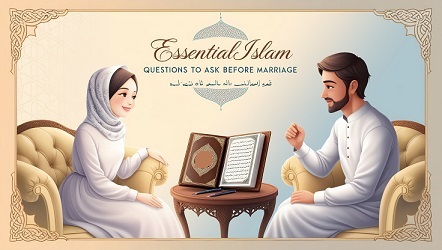Are you on the brink of marriage, ready to embark on a lifelong journey with your partner? 🕌💑 Before you take that momentous step, it’s crucial to ensure you’re both on the same page, especially when it comes to your Islamic faith and values. Many couples overlook essential conversations, only to face challenges later in their marriage. So know Islam Questions to Ask Before Marriage.
Imagine building a strong foundation for your future together, one that aligns with your beliefs and cultural expectations. By asking the right questions now, you can pave the way for a harmonious and blessed union. From understanding religious compatibility to addressing gender roles and financial matters in an Islamic context, there’s much to discuss.
In this blog post, we’ll explore seven key areas that every Muslim couple should delve into before tying the knot. These conversations will not only strengthen your bond but also help you navigate potential hurdles with grace and understanding. Let’s begin this journey of discovery and prepare you for a marriage built on shared values and mutual respect. 👇

Understanding Islamic Values and Beliefs
A. Core pillars of Islam
The foundation of Islam rests upon five essential pillars that every Muslim should understand and practice:
- Shahada (Declaration of Faith)
- Salah (Prayer)
- Zakat (Charity)
- Sawm (Fasting)
- Hajj (Pilgrimage)
| Pillar | Description |
|---|---|
| Shahada | Declaring belief in one God and Muhammad as His messenger |
| Salah | Performing five daily prayers |
| Zakat | Giving a portion of wealth to those in need |
| Sawm | Fasting during the month of Ramadan |
| Hajj | Pilgrimage to Mecca at least once in a lifetime |
B. Importance of faith in daily life
For Muslims, faith is not just a set of beliefs but a way of life that influences every aspect of their daily routines. It shapes their decision-making, moral compass, and interactions with others. Incorporating Islamic principles into daily life helps maintain a strong connection with Allah and fosters a sense of purpose and tranquility.
C. Expectations for religious practices
When considering marriage, it’s crucial to discuss expectations regarding religious practices. This includes:
- Frequency and method of prayer
- Observance of Islamic holidays and traditions
- Dietary restrictions (halal food)
- Modest dress code
- Participation in community religious activities
Understanding these Islamic values and beliefs is fundamental for a strong marital foundation. Now that we’ve explored the core aspects of faith, let’s move on to discussing religious compatibility between potential partners.

Discussing Religious Compatibility
Now that we’ve established the importance of understanding Islamic values and beliefs, let’s delve into the crucial aspect of religious compatibility between potential spouses.
Level of Religious Observance
When discussing religious compatibility, it’s essential to address the level of religious observance each partner maintains. This can include:
- Frequency of daily prayers
- Adherence to fasting during Ramadan
- Attendance at mosque or Islamic events
- Commitment to Islamic dress code
Interpretation of Islamic Teachings
Different individuals may have varying interpretations of Islamic teachings. It’s important to discuss these to ensure alignment:
| Topic | Partner A’s View | Partner B’s View |
|---|---|---|
| Halal dietary restrictions | Strict adherence | Flexible approach |
| Islamic finance principles | Follows closely | Open to alternatives |
| Gender mixing in social settings | Conservative | More liberal |
Attitudes Towards Different Schools of Thought
Islam has various schools of thought, and it’s crucial to discuss your perspectives on these:
- Sunni vs. Shia beliefs
- Acceptance of different madhabs (Islamic legal schools)
- Views on Sufism and other Islamic mystical traditions
Plans for Raising Children in the Faith
Lastly, discuss your plans for raising children within the Islamic faith:
- Islamic education and Quranic studies
- Participation in Islamic youth programs
- Celebration of Islamic holidays and traditions
- Balancing Islamic teachings with secular education
By addressing these aspects of religious compatibility, couples can ensure a strong foundation for their marriage based on shared Islamic values and practices.
Exploring Cultural Differences
Now that we’ve discussed religious compatibility, it’s important to delve into the cultural aspects that can significantly impact a Muslim marriage. Understanding and respecting each other’s cultural backgrounds is crucial for building a harmonious relationship.
Cultural Background and Traditions
Every Muslim couple brings unique cultural traditions to their marriage. It’s essential to explore these differences and find ways to blend them harmoniously. Consider discussing:
- Family customs and rituals
- Traditional clothing preferences
- Cuisine and dietary habits
- Language and communication styles
| Aspect | Partner 1 | Partner 2 | Potential Compromise |
|---|---|---|---|
| Cuisine | Middle Eastern | South Asian | Alternate cooking styles |
| Language | Arabic | Urdu | Learn basic phrases from each other |
| Clothing | Conservative | Modern | Respectful attire for family gatherings |
Family Expectations and Involvement
In many Muslim cultures, families play a significant role in marriages. Discuss:
- Extended family living arrangements
- Frequency of family visits
- Decision-making processes involving family members
- Expectations for caring for aging parents
Celebration of Islamic Holidays
While Islamic holidays are universal, their celebration can vary greatly across cultures. Address:
- Preferred ways to observe Ramadan
- Eid celebrations and gift-giving traditions
- Incorporating both partners’ cultural elements in holiday observances
Understanding these cultural differences will help you navigate potential challenges and create a unique blend of traditions in your marriage.
Addressing Gender Roles and Expectations
Now that we’ve explored cultural differences, it’s crucial to address gender roles and expectations within an Islamic marriage. This topic often generates passionate discussions and can significantly impact marital harmony.
Views on women’s rights in Islam
Islam grants women numerous rights, but interpretations can vary. It’s essential to discuss your understanding of these rights:
- Right to education
- Right to work and financial independence
- Right to own property
- Right to divorce
| Right | Islamic Perspective | Personal Interpretation |
|---|---|---|
| Education | Encouraged for both genders | [Discuss your view] |
| Work | Permitted with conditions | [Discuss your view] |
| Property Ownership | Guaranteed | [Discuss your view] |
| Divorce | Available option | [Discuss your view] |
Division of household responsibilities
Islamic teachings emphasize mutual cooperation in household matters. Discuss your expectations regarding:
- Cooking and cleaning
- Child-rearing responsibilities
- Financial management
Career aspirations and support
Both partners’ career goals should be respected and supported. Consider discussing:
- Long-term career plans
- Balancing work and family life
- Supporting each other’s professional growth
Understanding each other’s views on gender roles and expectations is crucial for building a strong, harmonious Islamic marriage. With these aspects clarified, let’s move on to discussing financial matters in an Islamic context.

Financial Matters in an Islamic Context
In an Islamic marriage, financial matters play a crucial role and are guided by specific principles. Understanding these aspects is essential for a harmonious union.
A. Understanding Islamic finance principles
Islamic finance is based on Shariah law, which prohibits interest (riba) and promotes ethical investing. Key principles include:
- Profit and loss sharing
- Asset-backed financing
- Prohibition of speculation
| Principle | Description |
|---|---|
| Profit and loss sharing | Both parties share risks and rewards |
| Asset-backed financing | Transactions must be backed by tangible assets |
| Prohibition of speculation | Gambling and excessive uncertainty are forbidden |
B. Attitudes towards debt and savings
Islam encourages financial responsibility and discourages unnecessary debt. Discuss your views on:
- Saving for emergencies
- Avoiding interest-based loans
- Balancing current needs with future planning
C. Expectations for financial support of extended family
In many Islamic cultures, supporting extended family is common. Consider:
- Your willingness to help family members financially
- Setting boundaries for financial assistance
- Agreeing on a budget for family support
D. Plans for charitable giving (Zakat)
Zakat, one of the Five Pillars of Islam, requires giving a portion of wealth to those in need. Discuss:
- Calculating Zakat accurately
- Choosing beneficiaries for your charitable giving
- Incorporating regular charitable donations into your budget
Understanding these financial aspects will help ensure that your marriage aligns with Islamic principles and values, fostering a strong foundation for your future together.

Conflict Resolution and Communication
Methods for addressing disagreements Islamically
In Islam, conflict resolution is rooted in principles of patience, understanding, and mutual respect. When addressing disagreements, couples should:
- Practice active listening
- Seek to understand each other’s perspective
- Use kind and respectful language
- Avoid raising voices or using hurtful words
Islamic teachings emphasize the importance of resolving conflicts promptly and fairly. The Prophet Muhammad (peace be upon him) said, “Reconcile with one another, for reconciliation is better” (Sahih al-Bukhari).
Attitude towards seeking marriage counseling
While traditionally some Muslims may have been hesitant to seek outside help, many now recognize the value of professional marriage counseling. It’s important to discuss:
- Openness to seeking help when needed
- Preference for Muslim counselors or those familiar with Islamic values
- Views on couples therapy as a preventive measure
| Pros of Marriage Counseling | Cons of Marriage Counseling |
|---|---|
| Professional guidance | Potential cultural stigma |
| Neutral third-party perspective | Privacy concerns |
| Skill-building for communication | Financial cost |
Views on compromise and mutual respect
Islam encourages spouses to treat each other with kindness and to seek middle ground in disputes. Couples should discuss their:
- Willingness to compromise on non-essential matters
- Commitment to showing respect even during disagreements
- Understanding of the Islamic concept of “shura” (mutual consultation)
By aligning on these aspects of conflict resolution and communication, couples can build a strong foundation for a harmonious marriage based on Islamic principles.
Planning for the Future
As we consider the journey of marriage in Islam, it’s crucial to look ahead and plan for the future together. This involves aligning personal aspirations with spiritual goals and community involvement.
Goals for Personal and Spiritual Growth
In an Islamic marriage, personal and spiritual growth go hand in hand. Couples should discuss their individual and shared goals for:
- Improving Quranic knowledge
- Enhancing daily prayers and dhikr
- Developing Islamic character traits
| Personal Growth | Spiritual Growth |
|---|---|
| Career development | Memorizing Quran |
| Skill acquisition | Increasing charitable acts |
| Physical fitness | Attending Islamic lectures |
Expectations for Islamic Education
Discussing expectations for Islamic education is vital, especially when considering future children. Key points to address include:
- Preferred methods of Islamic schooling (homeschooling, Islamic schools, or supplementary classes)
- Importance of Arabic language learning
- Balancing Islamic and secular education
Desires for Community Involvement
Active participation in the Muslim community strengthens faith and social bonds. Consider discussing:
- Roles in local mosque activities
- Volunteering for Islamic charities
- Organizing or attending Islamic events
Plans for Hajj or Umrah
Planning for Hajj or Umrah is an essential aspect of a Muslim’s life. Couples should discuss:
- Timeline for performing Hajj
- Frequency of Umrah trips
- Financial planning for these spiritual journeys
By addressing these future plans, couples can ensure they’re aligned in their spiritual and life goals, setting a strong foundation for their Islamic marriage.
Conclusion
Marriage in Islam is a sacred bond that requires careful consideration and open communication. By addressing essential questions related to religious beliefs, family dynamics, financial responsibilities, intimacy, personal growth, cultural integration, and conflict resolution, couples can build a strong foundation for a harmonious and fulfilling partnership.
As you embark on this journey of discovering compatibility with your potential spouse, remember that honesty and self-reflection are crucial. Take the time to explore these topics thoroughly, and don’t hesitate to seek guidance from trusted religious leaders or marriage counselors. By having these important conversations before marriage, you can ensure that you and your partner are well-prepared to navigate the joys and challenges of married life together, in accordance with Islamic principles.



